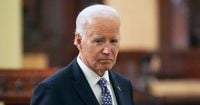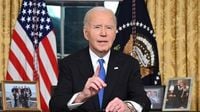Former President Joe Biden’s vision for a presidential library in Delaware—the state that shaped his decades-long political journey—has run into a wall of donor reluctance, raising questions about both his legacy and the future of these grand historical institutions. According to multiple reports from NBC News, FOX8, and SAN, the effort to raise between $200 million and $300 million for the Biden library is faltering, as former major donors and fundraisers are holding back their support for a variety of reasons.
Traditionally, presidential libraries are more than just buildings filled with dusty papers. They’re part archive, part museum, and part classroom, offering the public a window into the life and times of America’s leaders. Overseen by the National Archives, these libraries serve to preserve history, foster transparency, and spark civic discussion. But building and maintaining them is no small feat—costing taxpayers over $100 million a year, according to the National Taxpayers Union Foundation. Former presidents and their foundations are now expected to shoulder a greater share of the financial burden, but the lion’s share of the operating budget still comes from public funds.
Biden’s fundraising target is ambitious, but it’s a far cry from the $850 million spent on the Obama Presidential Library, set to open in Chicago in the spring of 2025. The Obama library, notably, is pioneering a fully digital archive, which experts say could eventually save millions and serve as a model for future presidential libraries. In contrast, the Biden project is struggling to even get off the ground.
What’s behind the donor hesitation? According to NBC News, more than half a dozen people who were once major Biden backers say they either won’t give to the library or will only contribute a limited amount. Their reasons are varied, but a few key issues keep surfacing.
First, there’s the specter of political retribution. Some donors are wary of becoming targets of the Trump administration if they’re seen supporting Biden’s legacy project. As Chris Korge, Democratic National Committee Fundraising Chair, told NBC News, “This is a very difficult time to raise large checks for Democrats because of how vindictive Donald Trump is.” The prospect of being in the crosshairs of a Trump-led White House is enough to make even the most loyal supporters think twice.
Second, donor fatigue is real. After years of pouring money into political campaigns, many major contributors are simply stretched thin. According to SAN, some say their resources are better spent on future Democratic campaigns or other causes, rather than bricks and mortar.
Third, personal experiences have left a sour taste for some. Several donors cited unpleasant interactions with Biden’s inner circle, describing situations where they were asked for hefty checks but never received so much as a returned phone call. As one donor bluntly put it to NBC News, “I’d like him to have some nice library. I just don’t see that’s where I’m going to spend my money.” Another donor was even more direct, saying “no way” when asked about contributing.
John Morgan, a prominent Florida lawyer and longtime Biden supporter, is perhaps the most vocal of the disenchanted. He claims to have raised $800,000 for Biden, only to see those funds redirected to Kamala Harris after she replaced Biden as the Democratic nominee in 2024. “I want an $800,000 refund,” Morgan told NBC News. He went so far as to joke, “I don’t believe a library will ever be built unless it’s a bookmobile from the old days.” Morgan’s frustration is echoed by others who feel their contributions were mishandled or their loyalty taken for granted.
Biden’s decision to seek re-election in 2024, despite mounting concerns over his age and health, also continues to cast a shadow over the fundraising campaign. After a highly scrutinized debate performance against Donald Trump, Biden bowed out of the race, paving the way for Kamala Harris to secure the Democratic nomination—only to lose to Trump in November. The fallout from that decision has left some party insiders and donors feeling burned, with lingering doubts about Biden’s judgment and the direction of the Democratic Party.
Despite these headwinds, there remains a core group of supporters determined to see the project through. Rufus Gifford, chairman of the library board and a former Obama campaign finance director, is putting on a brave face. “Those of us who have been around for a while and love the guy but also understand the full picture want to see what we can do to protect and promote his legacy,” Gifford told NBC News. “This isn’t about the past. It’s about the future.” Gifford’s optimism, however, stands in stark contrast to the skepticism expressed by many in the donor community.
Meanwhile, the competitive landscape for presidential libraries is heating up. Donald Trump is planning his own library in Florida, with a twist: among its planned exhibits is a 747 “megajet” originally acquired from the Qatari royal family. Trump’s library will also benefit from the proceeds of his legal settlements against news outlets, giving his fundraising a significant boost. Democrats have scrutinized these moves, but the contrast is clear—Trump’s project seems to have momentum, while Biden’s is stalled at the starting gate.
The broader debate over presidential libraries is also intensifying. With costs spiraling and questions about financial sustainability growing louder, some experts argue that the digital model pioneered by the Obama library could be the way forward. Digital archives not only promise long-term savings but also make presidential records more accessible to the public. Still, the allure of a grand physical building—part monument, part museum—remains strong for many supporters and historians.
For now, though, the Biden library’s fate hangs in the balance. The project’s modest fundraising goal, compared to its predecessors, reflects a new era of caution and skepticism among political donors. Whether Biden’s supporters can overcome their reservations—and whether the former president himself can play a meaningful role in rallying support—remains an open question.
One thing is clear: the struggle to fund the Biden Presidential Library is about more than money. It’s a reflection of the shifting sands of American politics, the personal dynamics of those in power, and the evolving expectations of donors and the public alike. As the story unfolds, it will serve as a telling chapter in the ongoing saga of how America remembers—and debates—the legacies of its leaders.





